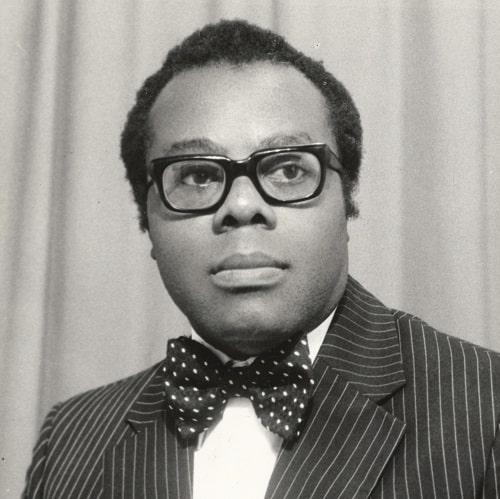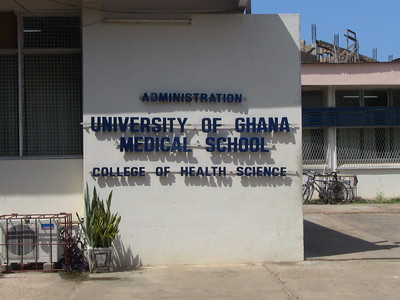
Joseph Orleans Mends Pobee (1930 – 2008) was a doctor, researcher and educator who rose to the position of professor of medicine at both the Universities of Ghana and of Zambia. Among many roles with medical organisations across the UK and Africa he was elected fellow of the RCP and was a founding fellow and founding secretary general of the West African College of Physicians (WACP). He was also a prominent researcher and promoted awareness in Ghana of the rise of hypertension, the impact of HIV infection and tuberculosis, and the threat of preventable tropical diseases.
Professor Pobee was born in Cape Coast Ghana in 1930 where his father John Mends Samuel Pobee was a schoomaster. Educated first in Cape Coast then at the University College of the Gold Coast, Pobee moved to London in 1956 to study medicine at the London Hospital Medical College of the University of London.
Pobee began his career in the UK working house jobs in surgery and gynaecology at St Mary’s Hospital in Plaistow. He returned to Ghana for an internship in internal medicine at Korle Bu Teaching Hospital in Accra, then worked as a government medical officer there. Medical officer in charge of Labadi Polyclinic and Ridge Hospital until the summer of 1964, he then returned to the UK for post-graduate training in internal medicine, which entailed working as medical registrar (resident) and senior registrar in Buckinghamshire Hospitals and at the London Hospital. Following further house jobs at Tindal Hospital in Aylesbury and time at Stoke Mandeville Hospital, he spent two years back at the London Hospital and became a member of the RCP in 1967.

In 1968, back in Ghana, Professor Pobee became senior registrar at Korle Bu Hospital and joined teaching staff in the department of medicine and therapeutics at the University of Ghana Medical School (UGMS), Accra. Beginning as a lecturer he moved through senior lecturer and associate professor, becoming full professor in 1987. In 1988 he became a World Health Organisation (WHO) consultant physician assigned to the School of Medicine at the University of Zambia and then professor of medicine there until 1997.
Throughout his career Pobee also took on many administrative and professional duties with a range of medical associations and organisations. In the field of education he was head of the department of medicine at UGMS from 1980-85 and vice dean 1982–86. He was an external examiner at eight medical schools across West, East and Southern Africa. He was also examiner at the postgraduate level for the fellowship qualification of the West African College of Physicians and for the Masters in Medicine (MMed) at the Universities of Zimbabwe, Dar-es-Salaam and Nairobi.
Pobee was a member of the Medical and Dental Council of Ghana, the RCP, RCP Edinburgh, the Ghana Nurses and Midwives Council and Ghana Medical Association. He became fellow of the RCP, RCP Edinburgh and the Ghana Medical Association where he also served as executive council member, vice president and president. He served as chairman to Ghana’s Ministry of Health Ethics Committee & Research 1984-86. He also took on international assignments such as honorary treasurer of the Pan African Society of Cardiology 1981-85, vice chairman on the WHO Expert Committee on Coronary Heart Disease in 1982, and in 1976 he became a founding fellow and founding general secretary for the WACP. The WACP objectives include promoting professional standards of training and practice for physicians, professional standards in West Africa and promoting and health and health in the region. The RCP enjoys a longstanding relationship with the WACP, with the first major collaboration beginning in 2009.
Professor Pobee was also a prominent researcher and used his work to promote awareness of key health issues for the people of Ghana in particular. Deeply concerned about the rise of hypertension in Ghana he was co-principal investigator of the WHO Hypertension and Cardiovascular Disease Project in Accra (1972-80) and project director of the Mamprobi Cardiovascular Project (1974-87). He served as a panel member on the WHO Expert Committee on Cardiovascular Diseases (1977-87) and vice chairman of the WHO Expert Committee on Coronary Heart Disease 1982. His cardiovascular research led to over 60 publications including three books on the subject, and he was editorial advisor to the Journal of Tropical Cardiology from its inception in 1975.
Pobee’s second major research focus considered the impacts of HIV infection and tuberculosis. He was co-principal investigator on a collaboration between the University of Zimbabwe School of Medicine and the London School of Hygiene and Tropical Medicine. He also co-authored numerous publications on HIV/AIDS related topics.
Pobee remained passionate about campaigning to raise awareness of health issues in Ghana though his final years. The year before he died, aged 77, he launched a book called Heart of the matter: community profile of cardiovascular diseases of a sub-Saharan African country: the Ghana paradigm: the Mamprobi Cardiovascular Health Project 1975-1983 (Accra, c.2006). He also spoke about the dangerous epidemic of hypertension in Ghana at the Golden Jubilee Lecture on the theme: "The Health of the Nation: Fifty Years After Independence," and warned about lifestyle changes that were creating risk factors for cardiovascular diseases. He also continued to campaign vigorously about the threats of preventable tropical diseases. In 2007 he was quoted in an editorial as saying that it was unfortunate that 50 years after independence, Ghana ranked second in the world in terms of guinea worm infection and deaths due to malaria, particularly in children.
Professor Pobee died in 2008 having shaped the education of many young doctors throughout his career and influenced health and medicine in Ghana through his research and many roles with organisations such as the Ghana Medical Association. After his passing the President of the Ghana Medical Association said, “Not only did he teach you to become doctors like him, if not better, but also groomed you in your formative years as house officers, medical officers and residents and even specialists. Some of you were bold to go up to him after graduation and refer to him as ‘colleague’. There are many more that have passed through his hands even until his passing away. You all bear witness to what he did for medicine and health in Ghana.”
Gail Chapman, public programmes officer
References
RCP editor, ‘Joseph Orleans Mends Pobee’, Inspiring Physicians [accessed 22/10/21]
‘Professor Joseph Orleans Mends Pobee’, Fellowship Awards, Ghana Medical Journal, vol 35:1, 2000 [accessed 22/10/21]
About us, West African College of Physicians [accessed 22/10/21]
RCP Global, ‘RCP further strengthens ties with West African College of Physicians’, 2016 [accessed 22/10/21]
‘The guinea worm, malaria menace’, Graphic Editorials, 2007 [accessed 22/10/21]
‘Hypertension is a real killer’, Modern Ghana, 2007 [accessed 22/10/21]
The President of the Ghana Medical Association, ‘Obituary: Professor J O M Pobee: The Indefatigable Physician’, Ghana Medical Journal 42 (3), 2008 [accessed 26/10/21]
Black History Month
The RCP are joining the annual commemoration of the history, achievements and contributions of black people in the UK this October – Black History Month.
To celebrate, the RCP are sharing stories and achievements of black health and care workers like Abdel Halim Mohamed Halim. Keep a look out on the RCP London and RCP Museum’s social media accounts as we highlight stories of inspiring black physicians from the past and today.
